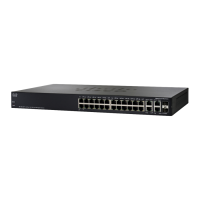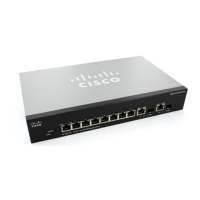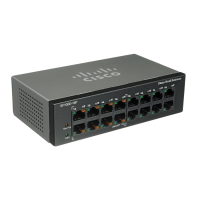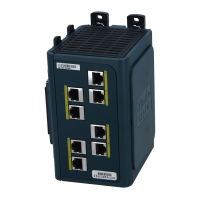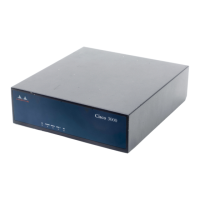Quality of Service
QoS Features and Components
491 Cisco Small Business 200, 300 and 500 Series Managed Switch Administration Guide (Internal Version)
25
QoS Modes
The QoS mode that is selected applies to all interfaces in the system.
• Basic Mode—Class of Service (CoS).
All traffic of the same class receives the same treatment, which is the single
QoS action of determining the egress queue on the egress port, based on
the indicated QoS value in the incoming frame. This can be the VLAN
Priority Tag (VPT) 802.1p value in Layer 2 and the Differentiated Service
Code Point (DSCP) value for IPv4 or Traffic Class (TC) value for IPv6 in
Layer 3. When operating in Basic Mode, the device trusts this external
assigned QoS value. The external assigned QoS value of a packet
determines its traffic class and QoS.
The header field to be trusted is entered in the Global Settings page. For
every value of that field, an egress queue is assigned where the frame is
sent in the CoS/802.1p to Queue page or the DSCP to Queue page
(depending on whether the trust mode is CoS/802.1p or DSCP,
respectively).
• Advanced Mode—Per-flow Quality of Service (QoS).
In advanced mode, a per flow QoS consists of a class map and/or a policer:
- A class map defines the kind of traffic in a flow, and contains one or more
ACLs. Packets that match the ACLs belong to the flow.
- A policer applies the configured QoS to a flow. The QoS configuration of
a flow may consist of egress queue, the DSCP or CoS/802.1p value, and
actions on out of profile (excess) traffic.
• Disable Mode—In this mode all traffic is mapped to a single best effort
queue, so that no type of traffic is prioritized over another.
Only a single mode can be active at a time. When the system is configured to work
in QoS Advanced mode, settings for QoS Basic mode are not active and vice
versa.
When the mode is changed, the following occurs:
• When changing from QoS Advanced mode to any other mode, policy profile
definitions and class maps are deleted. ACLs bonded directly to interfaces
remain bonded.
• When changing from QoS Basic mode to Advanced mode, the QoS Trust
mode configuration in Basic mode is not retained.
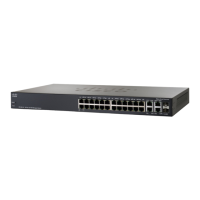
